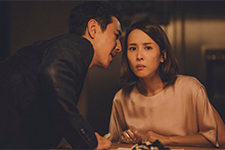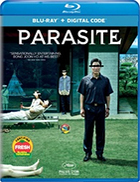Parasite (Gisaengchung)
|  As he did in his previous two films, Snowpiercer (2014) and Okja (2017), South Korean auteur Bong Joon Ho has created an indelibly entertaining and maniacal social satire in his latest film, the Palm d’Or-winning Parasite (Gisaengchung), which similarly juggles tones and genres while diving headfirst into the socio-cultural morass. Unlike those previous films, both of which were socially conscious science fiction parables set in a near future, Parasite is set very much in the here and now, where Bong and co-screenwriter Jin Won Han construct an elaborate thriller that at first seems to pit the have’s against the have-not’s, but is ultimately about how the have not’s are forced to turn against each other in the mad clamor for whatever dwindling social and economic crumbs they can find. The film focuses on two families, each from an opposite end of the socio-economic spectrum. We are first introduced to the Kim family: father Ki-Taek (Song Kang-ho), mother Chung-sook (Chang Hyae-jin), and their son and daughter Ki-woo (Choi Woo-shik) and Ki-jeong (Park So-da), who both look to be in their late teens or early 20s. The Kim family lives in a squalid basement apartment at the end of a street where a local drunk likes to urinate every evening. The first thing we see them doing is pacing about the apartment trying to pick up free Wi-fi for their smart phones, which is essential not just for whiling away the hours, but also for picking up work (they currently make ends meet folding pizza boxes for a pizza delivery company). One night, Ki-woo meets up with a friend who has been tutoring the teenage daughter of a wealthy family, and he offers to let Ki-woo take his place while he goes to study abroad for a semester. And so we are introduced to the Park family, led by Dong-ik (Lee Sun-kyun), the handsome, taciturn CEO of a major tech company. His wife, Yeon-gyo (Cho Yeo-jeong), is servile and fashionable and not terribly bright. They have two children, the teenage Da-hye (Jung Ziso), whose need for English language tutoring brings the Kim family into their family’s orbit, and elementary-age Da-song (Jung Hyeon-jun), a precocious tyke who is obsessed with American Indians. Once Ki-woo enters the Parks’ enormous, modernist mansion with its gleaming floors, massive windows looking onto a perfectly manicured lawn, immaculate kitchen, and vast open spaces, he sets in motion a plan to get his entire family hired by the Parks, but without them knowing that they are all related. He first gets his sister hired as an art tutor for Da-song, but getting his father and mother hired is more challenging because the Parks already have a full-time driver and housekeeper. So, they concoct plans to get each of them fired, which opens up an employment space first for Ki-taek as Dong-ik’s driver and then Chung-sook as the housekeeper. Bong stages this lengthy con with Hitchcockian verve and economy, in the process putting us squarely on the side of the Kims, despite (or perhaps because of) their chicanery. However, Bong allows elements of humanity to emerge in the Parks, as well; he resists depicting them as one-note one-percenters, but instead slowly reveals facets of their personalities that remind us that, despite the vantage of their lofty social and economic position, they are people with emotions, desires, and fears. To say much more about the plot risks ruining some of the film’s most delicious qualities, so suffice it say that things start to go horribly wrong when the Parks’ former housekeeper, Gook Moon-gwang (Lee Jung-eun), shows up one dark, rainy night while the Kims are taking advantage of the Parks being on a short vacation to get drunk in the living room and generally exploit the fashionable digs of their employer. Moon-gwang shows up, asking to be let in because she accidentally left something behind during her hasty departure after being fired, and the Kims inadvisably let her in. Bong’s experience in the horror genre (notably 2005’s The Host, his international breakthrough, and 2009’s Mother) quickly emerges, as the former housekeeper, who we had previously seen as a highly competent, thoroughly organized and efficient employee, now looking like a disheveled, perhaps psychotic monstrosity. With her mysteriously bruised face, forced smile, and gleaming eyes, she puts up a thin façade of normality that quickly falls apart once she informs the Kims of a secret hidden deep within the house that its owners don’t even know about. But there I go, giving away more than I’d like. There is so much that happens in the film’s second half that it is difficult not to go into details, but suffice it say that the unfolding events (none of which could possibly be guessed and none of which Bong hints at prior to their revelation) eventually pits the Kims against Moon-gwang and her husband, Geun-sae (Park Myung-hoon). Each holds leverage against the other, and it isn’t long before things turn violent, then more violent, then more violent. Bong cunningly stages the film’s bloodiest moments in both dark, hidden spaces and in broad, bright sunlight, contrasting secret worlds against the shiny social surfaces behind which they are hidden. Parasite is an incredibly masterful film—easily one of the best of this year—and it is not hard to see why it took home the the top award at this year’s Cannes Film Festival. Bong manages so many narrative surprises and unexpected moments that you think he couldn’t possibly keep it up, but then he springs one more on you. The cinematography by Kyung-pyo Hong (who also shot Snowpiercer and Mother) is formally masterful in the way it turns the Parks’ enormous house, which is situated on a hidden hill behind a seemingly innocuous street-level wall and garage, into a luminous stage that is both heightened fantasy and an all-too-real depiction of what the social elites call “normal.” Bong uses the house (where most of the film’s action takes place) as an upstairs-downstairs microcosm of inter- and intra-class struggle, just as he turned a speeding futuristic train into a literal manifestation of class warfare in Snowpiercer. Any sense of didacticism is lost in the mad rush of the narrative, which is so cunningly paced and feeds so brilliantly on both our expectations and our willingness to just go with it that you can’t help but feel both giddy with delight and horrified at the film’s extremes.
Copyright © 2020 James Kendrick Thoughts? E-mail James Kendrick All images copyright © Universal Pictures Home Entertainment | |||||||||||||||||||||||||||||
Overall Rating: 


 (4)
(4)


